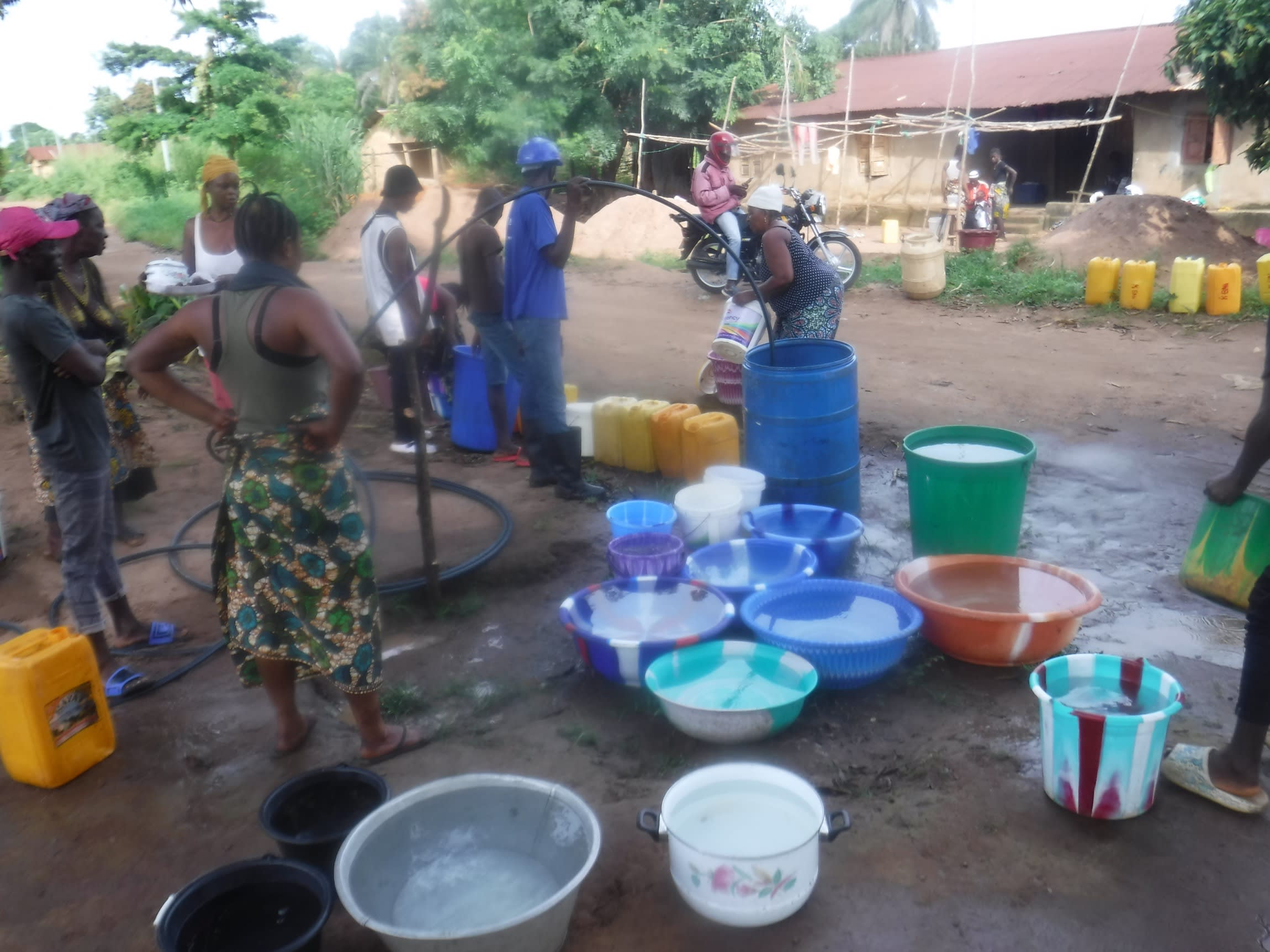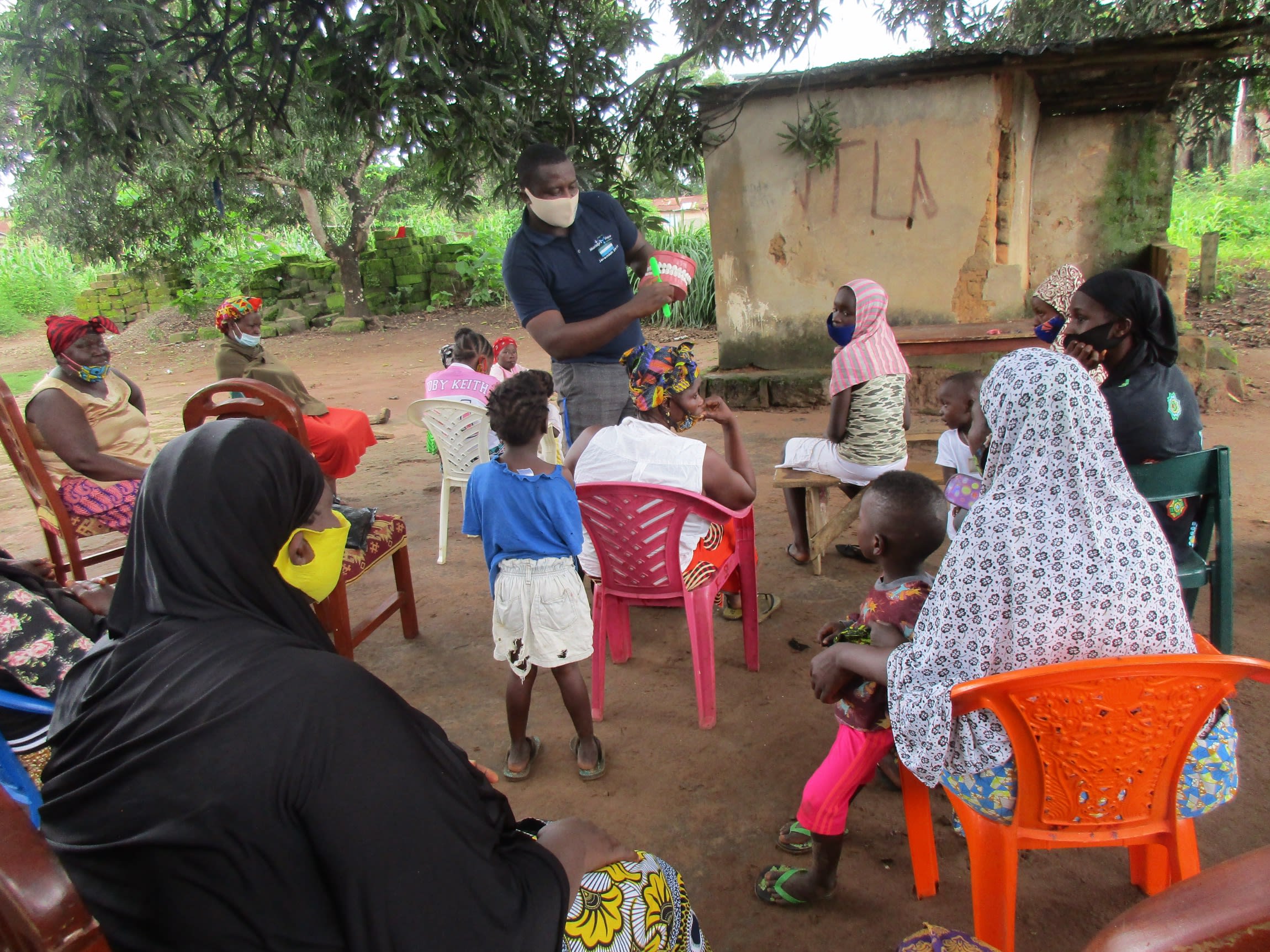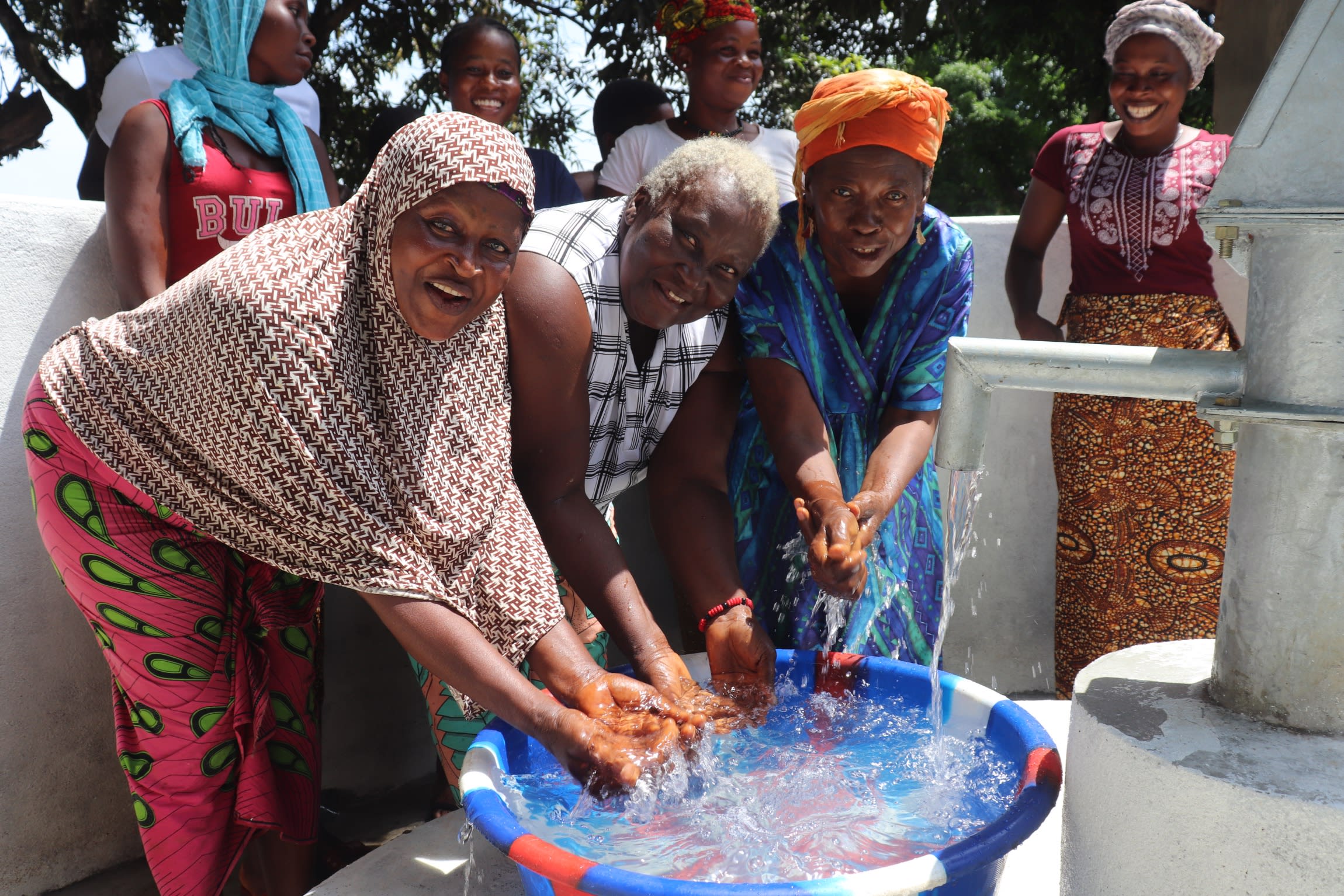February, 2022: Masoila, 28 Conteh Street Well Rehab Complete!
We are excited to share a safe, reliable water point at Masoila in Sierra Leone is now providing clean water to students and neighboring community members! We also conducted hygiene and sanitation training, which focused on healthy practices such as handwashing and using latrines.

Masiray, in the red shirt, cups water in her hands.
"I am a food vendor," said Masiray Sankoh, 23. "I prepare banana bread and [a] local ice drink to sell in schools. It was difficult for me to do all this, because of [the] safe and pure water challenge in our community. Having this water point at my doorstep, it is very easy for me now to prepare my food on time and make quick sales."

"Another impact is that the disabled in our community can [use the] water point ramp and fetch water easily," Masiray continued. "This water point can serve us throughout the year, and I think if we follow the hygiene and sanitation training, we cannot contract waterborne diseases like typhoid, diarrhea, and dysentery."

Mabinty uses the new pump.
"As a student, it was difficult for me to launder my uniforms and clothes two times a week because of the water shortage from our community water source," said 18-year-old Mabinty M. "With this blessing, I can now launder my uniforms and clothes two times a week and I will bathe on time before going to school. Having this water now will help us to practice better personal hygiene and to hold ablutions for prayer."
We held a dedication ceremony to officially hand over the well to the community members. The ceremony was attended by several local dignitaries like the village chief, a member of the Port Loko District Council, the Mapping Officer from the Ministry of Water Resources, and others. Each official gave a short speech thanking everyone who contributed to the rehabilitation of the water project. Then, Masiray and Mabinty made statements on their community's behalf. The ceremony concluded with celebration, singing, and dancing.

Celebrations for the new water point.
Clean Water Restored
The drill team arrived the day before beginning work. They set up camp and unpacked all of their tools and supplies to prepare for drilling the next day. The community provided space for the team to store their belongings, along with meals for the duration of their stay. The following day, the work began.

First, we raised the tripod, the structure we use to hold and maneuver each of the drilling tools. Next, we measured the well's original depth. We then socketed the pipes and installed a casing.
Finally, we lined up the drill rods and started to drill! We reached a final depth of 16 meters with water at nine meters. The hand-drill method allowed the team to install the cylinder far below the aquifer so that the community has great water access throughout the year.

With drilling complete, we installed screening and a filter pack to keep out debris when the water is pumped. We then cemented an iron rod to the well lining and fixed it with an iron collar at the top. Next, we bailed the well by hand for three days and flushed it, clearing any debris generated by the drilling process. Finally, we tested the yield to ensure the well would provide clean water with minimal effort at the pump.

Community members assisted by providing containers for the well yield test.
As the project neared completion, we built a cement platform, walls, and drainage system around the well to seal it off from surface-level contaminants. The drainage system helps to redirect runoff and spilled water to help avoid standing water at the well, which can not only be uncomfortable but unhygienic and a breeding ground for disease-carrying mosquitoes.

At last, we installed the stainless steel India Mk11 pump and conducted a water quality test. The test results showed that this is clean water fit for drinking!

New Knowledge
Before conducting any hygiene training, we made repeated phone calls and visits to the local water user committee to better understand the community’s challenges and lack of sanitation facilities. We shared the findings from our discussions with the committee members to help them make the necessary adjustments before the training began. For example, we identified households without handwashing stations or ones that may need to repair their latrines. With this information, community members worked together to improve hygiene and sanitation at home.
After this preparatory period, we scheduled a time when members from each household using the water point could attend a multi-day hygiene and sanitation training. We then dispatched our teams to local elder Mammy Haja Bangura's house to hold the meeting. Haja also helped facilitators to recruit community members to attend the training, which accounts for the high turnout!

Training topics covered included handwashing and tippy taps, good and bad hygiene habits, disease transmission and prevention, worms and parasites, dental hygiene, proper care of the well's pump, keeping the water clean, the cost recovery system, dish racks and clotheslines, the importance of toilets, keeping latrines clean, balanced diets, the diarrhea doll, and HIV and AIDS.
"The knowledge I have gathered from this hygiene and sanitation training is so important to me," said Haja Bangura, 70. "At my age, it's necessary for me to know how to care for myself since we aged people are very prone to diseases related to poor hygiene practices."

The most memorable topic in Masoila was dental hygiene. One boy in the audience said his grandmother's teeth look awful and pointed at her, which made everyone (including his grandmother) laugh. She explained that she has chewed kola nut and tobacco all her life and has not kept up with toothbrushing. One community member, a nurse, told everyone to keep their toothbrushes in a clean place and to brush twice a day.
"I am pleading with my fellow community members to put effort into practicing all that we have gained from this training, as it is for the good of everyone," said Haja.
"As a community member, I will follow all the rules and regulations set up by the Water User Committee, not to launder or bathe around the water point surroundings," concluded Masiray.
Mabinty is motivated to spread the news about water point maintenance to her peers. "I will take a leadership role to advise my peer group to use the newly reconstructed water source with proper care and always keep the water source environment clean. We the school children will help the Water Users Committee to clean the water source every Sunday."
When an issue arises concerning the well, community members are equipped with the necessary skills to rectify the problem and ensure the water point works appropriately. However, if the issue is beyond their capabilities, they can contact our field officers to assist them. Also, we will continue to offer them unmatchable support as a part of our ongoing monitoring and maintenance program.
Thank you for making all of this possible!


 Borehole Well and Hand Pump
Borehole Well and Hand Pump































